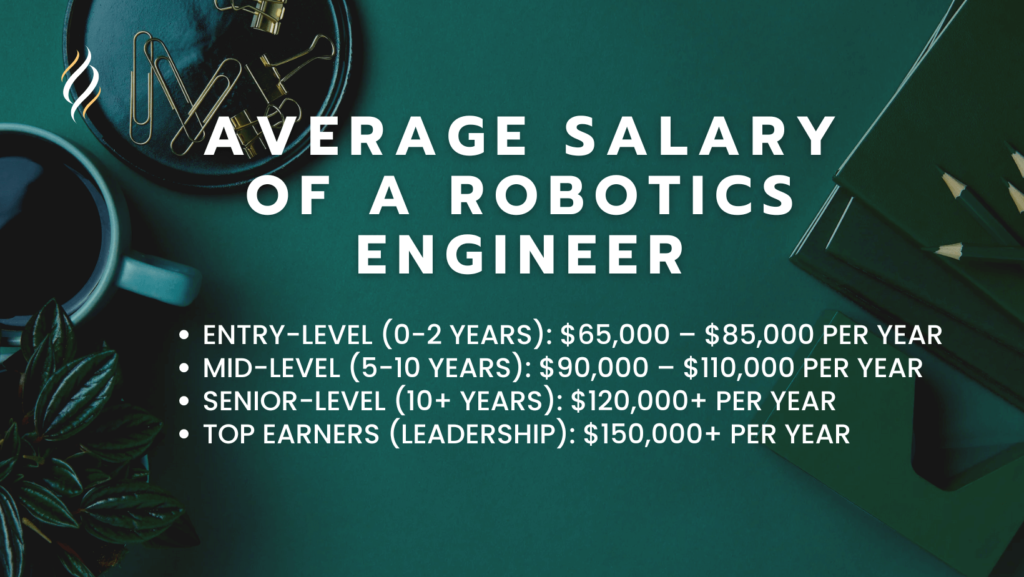What is the Salary of a Robotics Engineer?
Robotics engineering is a rapidly growing field that blends mechanical engineering, electrical engineering, and computer science to create automated systems and intelligent machines. With industries such as manufacturing, healthcare, and aerospace heavily investing in automation, the demand for skilled robotics engineers has increased significantly.
As a result, robotics engineer compensation has become a crucial topic for those considering a career in this high-tech field. Understanding the robotics engineer pay scale helps professionals and aspiring engineers set realistic salary expectations and career goals.
|
Key Takeaways
|
Robotics Engineer Salary: How Much Do Robotics Engineers Earn?
In addition to demand, several factors influence robotics engineer earnings, including industry, location, experience level, and specialized skills. Robotics engineers working in cutting-edge fields like artificial intelligence and autonomous systems often command higher salaries.
Moreover, those with advanced degrees and certifications typically earn more than their counterparts with only a bachelor’s degree. This article will explore What is the Salary of a Robotics Engineer?, covering everything from entry-level wages to senior-level compensation, along with salary trends and growth opportunities.
Average Salary of a Robotics Engineer
The robotics engineering salary range varies widely depending on factors such as experience, industry, and location. According to industry reports, entry-level robotics engineers can expect to earn between $65,000 and $85,000 annually, while mid-level professionals with five to ten years of experience earn between $90,000 and $110,000 per year.
Senior robotics engineers, especially those in leadership roles or working on high-stakes projects, can earn well over $120,000, with some top earners reaching $150,000 or more. These figures indicate that robotics engineer income is competitive, particularly in industries where automation plays a critical role.
Robotics engineer salary by experience shows a clear upward trend, meaning that professionals who continue developing their skills and gaining industry expertise can expect steady increases in pay.
Many robotics engineers also benefit from performance-based bonuses, stock options, and other financial incentives. As automation and robotics become more integral to industries worldwide, the robotics engineer average salary is expected to rise further, making this career path both lucrative and rewarding.

Factors Affecting Robotics Engineer Salary
Several key factors determine the robotics engineer wage, including educational background, certifications, and work experience. Engineers with a master’s or Ph.D. in robotics, artificial intelligence, or mechatronics often receive higher salaries than those with only a bachelor’s degree.
Additionally, professional certifications from organizations like the Robotics Industries Association (RIA) or specialized training in programming languages such as Python and C++ can boost a robotics engineer’s earning potential. Having expertise in cutting-edge fields like machine learning, computer vision, and autonomous robotics also increases salary prospects.
Location is another critical factor affecting robotics engineering salary range. Engineers working in tech hubs such as Silicon Valley, Boston, and Seattle tend to earn more than those in smaller cities or rural areas.
Similarly, certain industries, such as aerospace, defense, and healthcare robotics, offer higher salaries compared to traditional manufacturing roles. As companies compete for top talent in these sectors, they offer competitive compensation packages, driving up robotics engineer earnings.

Salary Comparison by Country
Robotics job salary varies significantly across different countries due to economic conditions, demand for automation, and government investments in technology. In the United States, robotics engineers earn an average salary of $90,000 to $120,000 per year, depending on experience and industry.
Canada offers slightly lower wages, with average salaries ranging between CAD 70,000 and CAD 100,000. In Europe, robotics engineers in Germany and the UK earn between €60,000 and €90,000, with Germany offering some of the highest salaries in the region due to its strong engineering and manufacturing sectors.
In contrast, developing countries such as India and China offer lower salaries but are rapidly expanding their robotics industries. In India, for example, entry-level robotics engineers earn around INR 6-10 lakh per annum, while experienced professionals can earn up to INR 20 lakh or more.
China’s robotics industry is booming, with salaries ranging between CNY 150,000 and CNY 400,000 annually. Although salaries in these countries are lower than in Western nations, the cost of living is also lower, making robotics engineering an attractive career choice worldwide.
Robotics Engineer Salary by Industry
The industry in which a robotics engineer works significantly impacts their salary. For example, the automotive industry, which heavily relies on robotics for manufacturing and automation, offers salaries ranging from $80,000 to $110,000 per year. Engineers working in healthcare and medical robotics, particularly those developing robotic-assisted surgery systems, earn even higher wages, often exceeding $120,000 annually.
Similarly, the aerospace and defense sectors, which require advanced robotic solutions for space exploration and military applications, provide some of the highest salaries in the field.
On the other hand, consumer electronics and research-based robotics positions may offer lower salaries initially but provide excellent growth opportunities. Startups in the robotics industry may not match the salary levels of large corporations but often compensate with stock options and performance bonuses.
As demand for automation continues to grow across various industries, robotics engineer salary growth is expected to remain strong, making this field a promising career choice.
Career Growth and Future Salary Trends
The demand for robotics engineers is expected to increase as automation, artificial intelligence, and robotics continue transforming industries. With advancements in machine learning, robotics engineers who specialize in AI-driven automation and autonomous systems will see higher salaries.
The trend towards Industry 4.0, which focuses on smart factories and the Internet of Things (IoT), is further driving the need for skilled robotics engineers. As companies invest more in robotics, robotics engineer earnings are expected to rise accordingly.
Additionally, professionals who continuously upskill and adapt to new technologies will have better career prospects. Robotics engineer salary growth is particularly strong for those with expertise in software development, robotics process automation (RPA), and cybersecurity. The future looks bright for robotics engineers, with steady salary increases and opportunities to work on groundbreaking projects shaping the future of automation.
How to Increase Your Salary as a Robotics Engineer
There are several ways for robotics engineers to increase their salaries. One of the most effective methods is to specialize in high-demand skills such as artificial intelligence, machine learning, and computer vision. Engineers who master advanced programming languages and gain expertise in embedded systems tend to command higher salaries. Pursuing an advanced degree or obtaining industry-recognized certifications can also significantly boost robotics engineer compensation.
Another strategy is to gain experience in high-paying industries such as aerospace, healthcare, or defense. Relocating to regions where robotics engineering jobs are in high demand, such as Silicon Valley or Boston, can also result in higher wages. Additionally, networking with industry professionals, attending robotics conferences, and staying updated on technological trends can open new career opportunities and salary advancements.

Conclusion
Robotics engineering is a lucrative career with strong salary growth potential. The robotics engineering salary range depends on various factors, including experience, industry, and location. While entry-level salaries are competitive, mid-level and senior professionals earn significantly higher wages, making this field financially rewarding. Engineers who continuously update their skills and stay ahead of industry trends can expect substantial career growth and increased earnings.
With automation becoming an integral part of modern industries, robotics engineer job salary is expected to rise steadily. As demand for robotics engineers continues to grow, professionals in this field have excellent career prospects, whether in manufacturing, healthcare, aerospace, or artificial intelligence-driven automation. For those passionate about robotics, this career path offers both financial stability and exciting opportunities to work on cutting-edge technologies.
FAQs What is the Salary of a Robotics Engineer
1. What is the average salary of a robotics engineer?
Answer: The average salary of a robotics engineer varies based on experience, location, and industry. In the U.S., the robotics engineering salary range is typically between $80,000 and $120,000 per year, with senior professionals earning over $150,000.
2. How does experience affect a robotics engineer’s salary?
Answer: A robotics engineer salary by experience increases significantly with expertise. Entry-level engineers earn around $60,000 to $80,000, while mid-level professionals make $90,000 to $110,000. Senior robotics engineers and managers can earn $130,000 or more.
3. Which industries pay the highest for robotics engineers?
Answer: Industries like aerospace, healthcare, and automation offer higher robotics engineer compensation. The automotive and manufacturing sectors also provide competitive salaries, with top robotics engineers earning over $120,000 annually.
4. Do robotics engineers earn more in certain locations?
Answer: Yes, the robotics job salary differs by region. Cities like San Francisco, Boston, and Seattle offer the highest salaries, often exceeding $130,000, while smaller cities may offer lower wages. Countries like Germany, Japan, and Canada also provide competitive pay.
5. What skills can increase a robotics engineer’s salary?
Answer: Developing expertise in AI, machine learning, and automation can boost robotics engineer earnings. Advanced programming skills in Python, C++, and ROS and certifications in robotic systems also contribute to higher wages.
6. What is the salary growth potential for robotics engineers?
Answer: The robotics engineer salary growth is strong, with increasing demand in automation and AI. Salaries rise with experience, leadership roles, and specialized skills, often exceeding $150,000 for experts.
7. How does education impact a robotics engineer’s salary?
Answer: A bachelor’s degree in robotics or mechanical engineering is the minimum requirement. However, a master’s or Ph.D. in robotics can lead to higher robotics engineer pay scale, often exceeding $120,000.
8. Is freelancing or contract work profitable for robotics engineers?
Answer: Yes, freelance robotics engineers can earn competitive rates, sometimes making over $100 per hour. Contract-based jobs in AI, automation, and industrial robotics offer high robotics engineer income for experienced professionals.
9. What is the future salary trend for robotics engineers?
Answer: With the increasing adoption of robotics in industries like healthcare, logistics, and AI, robotics engineering salary range is expected to grow. Demand for skilled engineers will push salaries higher, especially for AI-integrated robotics roles.
10. How can I maximize my salary as a robotics engineer?
Answer: To increase your robotics engineer wage, focus on certifications, leadership roles, and specialization in AI-driven robotics. Relocating to high-paying cities and working in top-paying industries like aerospace and medical robotics can also boost income.

